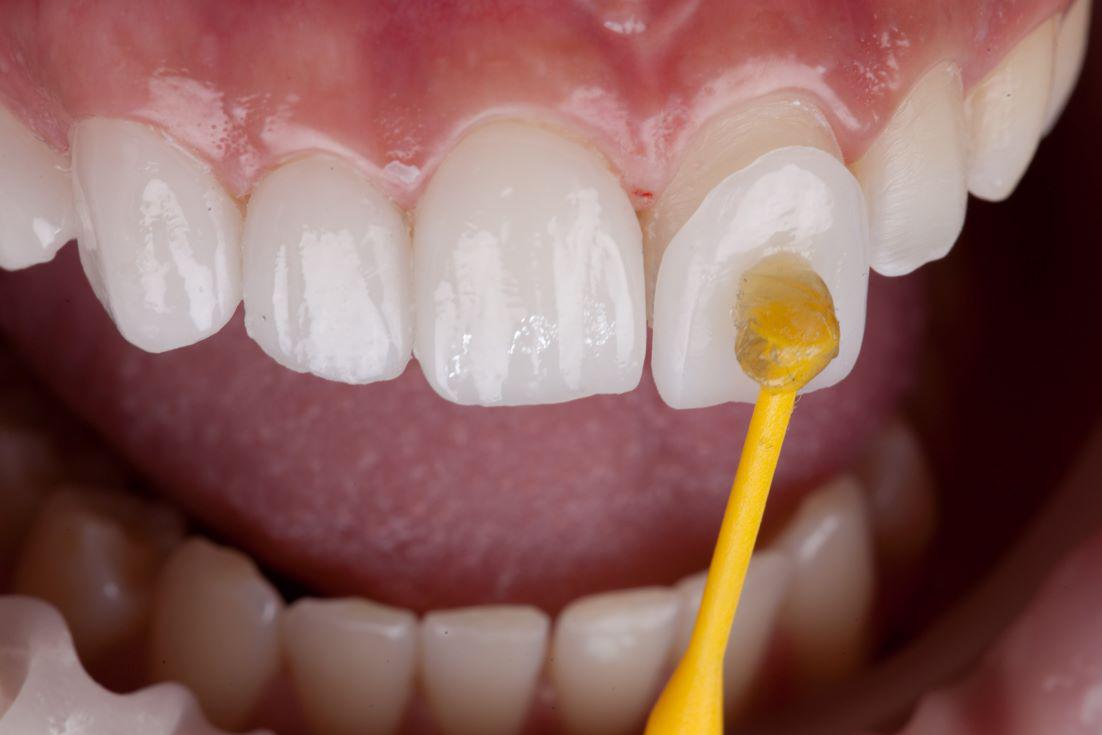 Dental veneers are an excellent cosmetic dentistry option for people who are insecure about their smiles. You may want to consider veneers if you have cosmetic flaws like extrinsic dental stains, crooked teeth, gapped teeth, misshapen teeth, or short teeth. One, two, or several veneers can be used to correct these issues.
Dental veneers are an excellent cosmetic dentistry option for people who are insecure about their smiles. You may want to consider veneers if you have cosmetic flaws like extrinsic dental stains, crooked teeth, gapped teeth, misshapen teeth, or short teeth. One, two, or several veneers can be used to correct these issues.
Veneers are not a permanent solution, and porcelain veneers are irreversible. We discuss exactly what that means and other considerations in this blog.
The Veneers Process
The reason why porcelain veneers are irreversible is because of how they are bonded to the teeth. The process for composite and porcelain begins with isolating the teeth that are receiving veneers. Then, the dentist applies a local anesthetic to the treatment area and cleans the tooth.
The next part is what makes porcelain veneers an irreversible solution– the dentist etches the tooth. This involves removing some dental enamel to create a strong bond between the tooth and veneer and prevent the veneers from appearing large and horse-like. This step is not necessary for patients who choose composite resin veneers.
Then, the dentist will apply a dental adhesive and, finally, place the veneers. If the veneers are not the right shape or size, the dentist will be able to make adjustments.
Longevity: Dental Veneers Materials and How Long They Last
When considering veneers, the material is another aspect to think about. There are two common types of dental veneer materials: composite and porcelain.
Composite Veneers
Also known as same-day veneers, composite resin is a cheaper veneer option. This material is also easier for dentists to manipulate and shape. Composite veneers typically last 4-8 years and are not as strong as porcelain. However, if a composite veneer is chipped, it can be repaired. Composite veneers look natural but not as natural as porcelain, and composite resin stains like natural teeth. Additionally, composite veneers can be removed without needing to be replaced. This is an important distinction between the two materials.
Porcelain Veneers
The greatest benefit of porcelain is that it lasts much longer than composite– 10-15 years. Additionally, porcelain veneers have a translucent property that makes them appear much more natural than composite veneers. Porcelain veneers are also stain-resistant, so you should never have to whiten your teeth again.
As stated earlier, porcelain veneers are irreversible because the dentist removes a portion of the patient’s dental enamel before placing them. Therefore, if a porcelain veneer chips, cracks, or breaks in any way, it must be replaced by another veneer or some kind of dental restoration.
How To Care For Veneers
Veneers are designed to look and feel as natural as possible. Caring for veneers doesn’t require extra steps, but it may require you to use more caution while eating and switching out your oral hygiene products for ones with different ingredients.
Here are 7 tips for making your veneers last as long as possible:
Brush and floss daily. As you do with your natural teeth, you should brush twice a day, in the morning and evening, and floss once a day. Not following these guidelines can increase your risk of gum disease.
Switch your toothpaste. If your current toothpaste contains hydrogen peroxide, sodium bicarbonate, or baking soda, it’s a good idea to switch to a gel product to help your veneers last as long as possible.
Break bad habits. Do you bite your nails? Chew ice? Use your teeth as a tool to open packages? You should not do any of those things with your natural teeth, but you especially shouldn't do those things with veneers as they are much more susceptible to breaking.
Avoid certain foods. This rule includes hard foods, tough foods, sugary substances, and acidic substances. Apples, raw carrots, beef jerky, ice cream, candies, and crackers can all put your veneers at risk. Of course, you don't have to completely avoid these foods, but be aware of the damage that can be done. Instead of biting into an apple, cut it up into smaller pieces. Drink water after eating ice cream or crackers to rid your mouth of sugars and starches.
Address teeth grinding. Teeth grinding, or bruxism, causes serious damage to teeth and veneers. It’s important to discuss this issue with your dentist before having veneers placed. Your dentist may recommend a mouthguard and other helpful bruxism treatments.
Switch your toothbrush. Hard bristled manual toothbrushes aren’t the ideal tool for patients with veneers. Most dentists recommend soft-bristled electric toothbrushes to ensure you aren’t using too much force while brushing.
Visit your dentist regularly. Regular dental cleaning and exam appointments are essential to keeping your mouth healthy. Dentists can detect early signs of cavities and gum disease so you never have to deal with painful and damaging symptoms.
Learn If Veneers Are Right For You
Dental veneers could change your smile (and your life!) for the better. Our friendly dental team can help you decide if veneers are the best option or if there is another cosmetic dentistry treatment that can help you achieve your smile goals. Contact us today to schedule an initial consultation.

